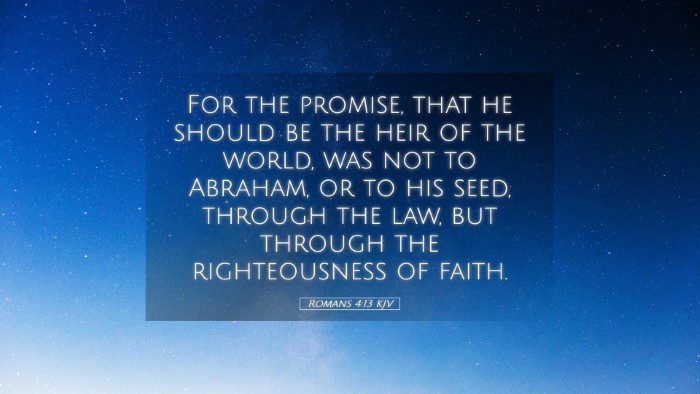Old Testament
Genesis Exodus Leviticus Numbers Deuteronomy Joshua Judges Ruth 1 Samuel 2 Samuel 1 Kings 2 Kings 1 Chronicles 2 Chronicles Ezra Nehemiah Esther Job Psalms Proverbs Ecclesiastes Song of Solomon Isaiah Jeremiah Lamentations Ezekiel Daniel Hosea Joel Amos Obadiah Jonah Micah Nahum Habakkuk Zephaniah Haggai Zechariah MalachiRomans 4:13
Romans 4:13 KJV
For the promise, that he should be the heir of the world, was not to Abraham, or to his seed, through the law, but through the righteousness of faith.
Romans 4:13 Bible Commentary
Commentary on Romans 4:13
Verse: "For the promise that he would be the heir of the world was not to Abraham or to his seed through the law, but through the righteousness of faith."
Introduction
Romans 4:13 presents a cornerstone of Pauline theology, elucidating the nature of the blessing promised to Abraham. This commentary draws upon the insights of renowned biblical scholars such as Matthew Henry, Albert Barnes, and Adam Clarke, providing a comprehensive examination beneficial to pastors, students, theologians, and Bible scholars.
Contextual Analysis
Paul, in this epistle to the Romans, emphasizes justification by faith over adherence to the law. The context surrounding Romans 4 reveals Paul’s intention to demonstrate that the promise made to Abraham was not contingent upon legalistic observance but was rooted in faith and grace. This shifts the focus away from the Law of Moses to the principle of faith that God honors.
Abraham: The Prototype of Faith
Paul invokes Abraham as a central figure in demonstrating how righteousness is attained. Matthew Henry notes that Abraham received the promise not through the law, which had not yet been given, but through faith, indicating that God’s covenant is fundamentally relational rather than transactional.
The Nature of the Promise
- Universal Heirship: The idea that Abraham would be the "heir of the world" suggests a promise that transcends territorial and ethnic boundaries. Albert Barnes highlights that it encompasses not just a physical inheritance but spiritual dominion, which is fulfilled in Christ.
- Exclusivity of Faith: Adam Clarke emphasizes that the promise is contingent upon righteousness by faith rather than legal obligations. Abraham’s faith created a path for all who believe, establishing a legacy of faith for both Jews and Gentiles.
Theological Implications
The implications of this verse extend deeply into the doctrine of salvation. It challenges the notion that one can attain righteousness through works, illustrating instead that faith is the means through which believers share in the inheritance promised to Abraham. This doctrine calls attention to the sufficiency of Christ's work as the ultimate fulfillment of God's promises.
Justification by Faith
Henry states that justification by faith implies that believers are declared righteous before God solely on the basis of their faith in Christ. This principle underscores the idea that righteousness is imputed rather than earned, which was a revolutionary thought in Jewish religious context at the time.
Faith Extends to All Nations
The promise to Abraham foreshadows the global reach of the Gospel. Barnes argues that the faith of Abraham serves as a model for all believers, demonstrating that God’s grace is available to everyone, regardless of their background or heritage. This universal aspect of Abraham's faith enriches the church's understanding of its mission.
Practical Application
Romans 4:13, when carefully considered, provides profound insights into practical Christian living. Recognizing that righteousness is through faith encourages believers to embrace a relationship with God based on trust rather than fear of legalism.
Living in Faith
Clarke emphasizes that believers are called to live out their faith actively, trusting in God's promises despite circumstances. This assurance fosters a life characterized by peace and confidence in God’s plans, aligning with the hope promised to Abraham.
Identity as Heirs
For pastors and church leaders, this verse can be a powerful reminder to the congregation of their identity as heirs of God. Understanding their status as children of God inheriting the world through faith can empower believers to live with purpose and expectation, confidently engaging in mission and ministry.
Conclusion
In summary, Romans 4:13 articulates a pivotal truth about faith and inheritance that resonates through the ages. The insights from Matthew Henry, Albert Barnes, and Adam Clarke focus on the essence of faith as the means to attain righteousness, the universal implications of the promise to Abraham, and the transformative power it has in the lives of believers. As such, this verse serves as both a doctrinal foundation and a clarion call to embody faith in every aspect of life.


